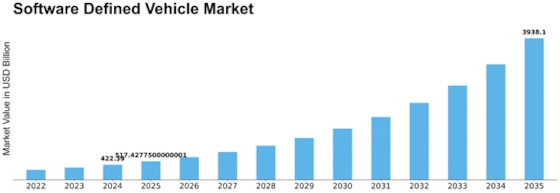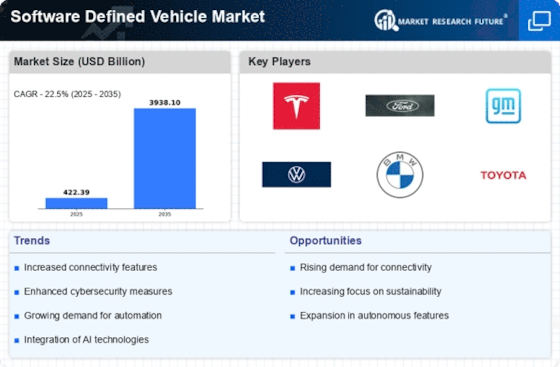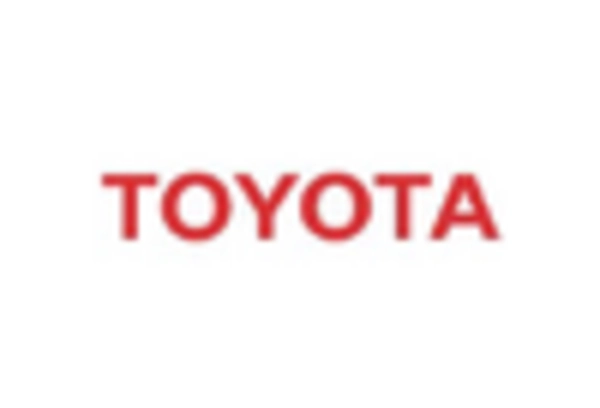Centralized Architecture
Distributed Architecture
Hybrid Architecture
Vehicle Control Software
Driver Assistance Software
Infotainment Software
Telematics Software
Passenger Vehicles
Commercial Vehicles
Two-Wheelers
Heavy-Duty Vehicles
OEMs
Fleet Operators
Individual Consumers
North America
Europe
South America
Asia Pacific
Middle East and Africa
North America Outlook (USD Billion, 2019-2035)
North America Software Defined Vehicle Market by Architecture Type
Centralized Architecture
Distributed Architecture
Hybrid Architecture
North America Software Defined Vehicle Market by Software Type
Vehicle Control Software
Driver Assistance Software
Infotainment Software
Telematics Software
North America Software Defined Vehicle Market by Vehicle Type
Passenger Vehicles
Commercial Vehicles
Two-Wheelers
Heavy-Duty Vehicles
North America Software Defined Vehicle Market by End User Type
OEMs
Fleet Operators
Individual Consumers
North America Software Defined Vehicle Market by Regional Type
US
Canada
US Outlook (USD Billion, 2019-2035)
US Software Defined Vehicle Market by Architecture Type
Centralized Architecture
Distributed Architecture
Hybrid Architecture
US Software Defined Vehicle Market by Software Type
Vehicle Control Software
Driver Assistance Software
Infotainment Software
Telematics Software
US Software Defined Vehicle Market by Vehicle Type
Passenger Vehicles
Commercial Vehicles
Two-Wheelers
Heavy-Duty Vehicles
US Software Defined Vehicle Market by End User Type
OEMs
Fleet Operators
Individual Consumers
CANADA Outlook (USD Billion, 2019-2035)
CANADA Software Defined Vehicle Market by Architecture Type
Centralized Architecture
Distributed Architecture
Hybrid Architecture
CANADA Software Defined Vehicle Market by Software Type
Vehicle Control Software
Driver Assistance Software
Infotainment Software
Telematics Software
CANADA Software Defined Vehicle Market by Vehicle Type
Passenger Vehicles
Commercial Vehicles
Two-Wheelers
Heavy-Duty Vehicles
CANADA Software Defined Vehicle Market by End User Type
OEMs
Fleet Operators
Individual Consumers
Europe Outlook (USD Billion, 2019-2035)
Europe Software Defined Vehicle Market by Architecture Type
Centralized Architecture
Distributed Architecture
Hybrid Architecture
Europe Software Defined Vehicle Market by Software Type
Vehicle Control Software
Driver Assistance Software
Infotainment Software
Telematics Software
Europe Software Defined Vehicle Market by Vehicle Type
Passenger Vehicles
Commercial Vehicles
Two-Wheelers
Heavy-Duty Vehicles
Europe Software Defined Vehicle Market by End User Type
OEMs
Fleet Operators
Individual Consumers
Europe Software Defined Vehicle Market by Regional Type
Germany
UK
France
Russia
Italy
Spain
Rest of Europe
GERMANY Outlook (USD Billion, 2019-2035)
GERMANY Software Defined Vehicle Market by Architecture Type
Centralized Architecture
Distributed Architecture
Hybrid Architecture
GERMANY Software Defined Vehicle Market by Software Type
Vehicle Control Software
Driver Assistance Software
Infotainment Software
Telematics Software
GERMANY Software Defined Vehicle Market by Vehicle Type
Passenger Vehicles
Commercial Vehicles
Two-Wheelers
Heavy-Duty Vehicles
GERMANY Software Defined Vehicle Market by End User Type
OEMs
Fleet Operators
Individual Consumers
UK Outlook (USD Billion, 2019-2035)
UK Software Defined Vehicle Market by Architecture Type
Centralized Architecture
Distributed Architecture
Hybrid Architecture
UK Software Defined Vehicle Market by Software Type
Vehicle Control Software
Driver Assistance Software
Infotainment Software
Telematics Software
UK Software Defined Vehicle Market by Vehicle Type
Passenger Vehicles
Commercial Vehicles
Two-Wheelers
Heavy-Duty Vehicles
UK Software Defined Vehicle Market by End User Type
OEMs
Fleet Operators
Individual Consumers
FRANCE Outlook (USD Billion, 2019-2035)
FRANCE Software Defined Vehicle Market by Architecture Type
Centralized Architecture
Distributed Architecture
Hybrid Architecture
FRANCE Software Defined Vehicle Market by Software Type
Vehicle Control Software
Driver Assistance Software
Infotainment Software
Telematics Software
FRANCE Software Defined Vehicle Market by Vehicle Type
Passenger Vehicles
Commercial Vehicles
Two-Wheelers
Heavy-Duty Vehicles
FRANCE Software Defined Vehicle Market by End User Type
OEMs
Fleet Operators
Individual Consumers
RUSSIA Outlook (USD Billion, 2019-2035)
RUSSIA Software Defined Vehicle Market by Architecture Type
Centralized Architecture
Distributed Architecture
Hybrid Architecture
RUSSIA Software Defined Vehicle Market by Software Type
Vehicle Control Software
Driver Assistance Software
Infotainment Software
Telematics Software
RUSSIA Software Defined Vehicle Market by Vehicle Type
Passenger Vehicles
Commercial Vehicles
Two-Wheelers
Heavy-Duty Vehicles
RUSSIA Software Defined Vehicle Market by End User Type
OEMs
Fleet Operators
Individual Consumers
ITALY Outlook (USD Billion, 2019-2035)
ITALY Software Defined Vehicle Market by Architecture Type
Centralized Architecture
Distributed Architecture
Hybrid Architecture
ITALY Software Defined Vehicle Market by Software Type
Vehicle Control Software
Driver Assistance Software
Infotainment Software
Telematics Software
ITALY Software Defined Vehicle Market by Vehicle Type
Passenger Vehicles
Commercial Vehicles
Two-Wheelers
Heavy-Duty Vehicles
ITALY Software Defined Vehicle Market by End User Type
OEMs
Fleet Operators
Individual Consumers
SPAIN Outlook (USD Billion, 2019-2035)
SPAIN Software Defined Vehicle Market by Architecture Type
Centralized Architecture
Distributed Architecture
Hybrid Architecture
SPAIN Software Defined Vehicle Market by Software Type
Vehicle Control Software
Driver Assistance Software
Infotainment Software
Telematics Software
SPAIN Software Defined Vehicle Market by Vehicle Type
Passenger Vehicles
Commercial Vehicles
Two-Wheelers
Heavy-Duty Vehicles
SPAIN Software Defined Vehicle Market by End User Type
OEMs
Fleet Operators
Individual Consumers
REST OF EUROPE Outlook (USD Billion, 2019-2035)
REST OF EUROPE Software Defined Vehicle Market by Architecture Type
Centralized Architecture
Distributed Architecture
Hybrid Architecture
REST OF EUROPE Software Defined Vehicle Market by Software Type
Vehicle Control Software
Driver Assistance Software
Infotainment Software
Telematics Software
REST OF EUROPE Software Defined Vehicle Market by Vehicle Type
Passenger Vehicles
Commercial Vehicles
Two-Wheelers
Heavy-Duty Vehicles
REST OF EUROPE Software Defined Vehicle Market by End User Type
OEMs
Fleet Operators
Individual Consumers
APAC Outlook (USD Billion, 2019-2035)
APAC Software Defined Vehicle Market by Architecture Type
Centralized Architecture
Distributed Architecture
Hybrid Architecture
APAC Software Defined Vehicle Market by Software Type
Vehicle Control Software
Driver Assistance Software
Infotainment Software
Telematics Software
APAC Software Defined Vehicle Market by Vehicle Type
Passenger Vehicles
Commercial Vehicles
Two-Wheelers
Heavy-Duty Vehicles
APAC Software Defined Vehicle Market by End User Type
OEMs
Fleet Operators
Individual Consumers
APAC Software Defined Vehicle Market by Regional Type
China
India
Japan
South Korea
Malaysia
Thailand
Indonesia
Rest of APAC
CHINA Outlook (USD Billion, 2019-2035)
CHINA Software Defined Vehicle Market by Architecture Type
Centralized Architecture
Distributed Architecture
Hybrid Architecture
CHINA Software Defined Vehicle Market by Software Type
Vehicle Control Software
Driver Assistance Software
Infotainment Software
Telematics Software
CHINA Software Defined Vehicle Market by Vehicle Type
Passenger Vehicles
Commercial Vehicles
Two-Wheelers
Heavy-Duty Vehicles
CHINA Software Defined Vehicle Market by End User Type
OEMs
Fleet Operators
Individual Consumers
INDIA Outlook (USD Billion, 2019-2035)
INDIA Software Defined Vehicle Market by Architecture Type
Centralized Architecture
Distributed Architecture
Hybrid Architecture
INDIA Software Defined Vehicle Market by Software Type
Vehicle Control Software
Driver Assistance Software
Infotainment Software
Telematics Software
INDIA Software Defined Vehicle Market by Vehicle Type
Passenger Vehicles
Commercial Vehicles
Two-Wheelers
Heavy-Duty Vehicles
INDIA Software Defined Vehicle Market by End User Type
OEMs
Fleet Operators
Individual Consumers
JAPAN Outlook (USD Billion, 2019-2035)
JAPAN Software Defined Vehicle Market by Architecture Type
Centralized Architecture
Distributed Architecture
Hybrid Architecture
JAPAN Software Defined Vehicle Market by Software Type
Vehicle Control Software
Driver Assistance Software
Infotainment Software
Telematics Software
JAPAN Software Defined Vehicle Market by Vehicle Type
Passenger Vehicles
Commercial Vehicles
Two-Wheelers
Heavy-Duty Vehicles
JAPAN Software Defined Vehicle Market by End User Type
OEMs
Fleet Operators
Individual Consumers
SOUTH KOREA Outlook (USD Billion, 2019-2035)
SOUTH KOREA Software Defined Vehicle Market by Architecture Type
Centralized Architecture
Distributed Architecture
Hybrid Architecture
SOUTH KOREA Software Defined Vehicle Market by Software Type
Vehicle Control Software
Driver Assistance Software
Infotainment Software
Telematics Software
SOUTH KOREA Software Defined Vehicle Market by Vehicle Type
Passenger Vehicles
Commercial Vehicles
Two-Wheelers
Heavy-Duty Vehicles
SOUTH KOREA Software Defined Vehicle Market by End User Type
OEMs
Fleet Operators
Individual Consumers
MALAYSIA Outlook (USD Billion, 2019-2035)
MALAYSIA Software Defined Vehicle Market by Architecture Type
Centralized Architecture
Distributed Architecture
Hybrid Architecture
MALAYSIA Software Defined Vehicle Market by Software Type
Vehicle Control Software
Driver Assistance Software
Infotainment Software
Telematics Software
MALAYSIA Software Defined Vehicle Market by Vehicle Type
Passenger Vehicles
Commercial Vehicles
Two-Wheelers
Heavy-Duty Vehicles
MALAYSIA Software Defined Vehicle Market by End User Type
OEMs
Fleet Operators
Individual Consumers
THAILAND Outlook (USD Billion, 2019-2035)
THAILAND Software Defined Vehicle Market by Architecture Type
Centralized Architecture
Distributed Architecture
Hybrid Architecture
THAILAND Software Defined Vehicle Market by Software Type
Vehicle Control Software
Driver Assistance Software
Infotainment Software
Telematics Software
THAILAND Software Defined Vehicle Market by Vehicle Type
Passenger Vehicles
Commercial Vehicles
Two-Wheelers
Heavy-Duty Vehicles
THAILAND Software Defined Vehicle Market by End User Type
OEMs
Fleet Operators
Individual Consumers
INDONESIA Outlook (USD Billion, 2019-2035)
INDONESIA Software Defined Vehicle Market by Architecture Type
Centralized Architecture
Distributed Architecture
Hybrid Architecture
INDONESIA Software Defined Vehicle Market by Software Type
Vehicle Control Software
Driver Assistance Software
Infotainment Software
Telematics Software
INDONESIA Software Defined Vehicle Market by Vehicle Type
Passenger Vehicles
Commercial Vehicles
Two-Wheelers
Heavy-Duty Vehicles
INDONESIA Software Defined Vehicle Market by End User Type
OEMs
Fleet Operators
Individual Consumers
REST OF APAC Outlook (USD Billion, 2019-2035)
REST OF APAC Software Defined Vehicle Market by Architecture Type
Centralized Architecture
Distributed Architecture
Hybrid Architecture
REST OF APAC Software Defined Vehicle Market by Software Type
Vehicle Control Software
Driver Assistance Software
Infotainment Software
Telematics Software
REST OF APAC Software Defined Vehicle Market by Vehicle Type
Passenger Vehicles
Commercial Vehicles
Two-Wheelers
Heavy-Duty Vehicles
REST OF APAC Software Defined Vehicle Market by End User Type
OEMs
Fleet Operators
Individual Consumers
South America Outlook (USD Billion, 2019-2035)
South America Software Defined Vehicle Market by Architecture Type
Centralized Architecture
Distributed Architecture
Hybrid Architecture
South America Software Defined Vehicle Market by Software Type
Vehicle Control Software
Driver Assistance Software
Infotainment Software
Telematics Software
South America Software Defined Vehicle Market by Vehicle Type
Passenger Vehicles
Commercial Vehicles
Two-Wheelers
Heavy-Duty Vehicles
South America Software Defined Vehicle Market by End User Type
OEMs
Fleet Operators
Individual Consumers
South America Software Defined Vehicle Market by Regional Type
Brazil
Mexico
Argentina
Rest of South America
BRAZIL Outlook (USD Billion, 2019-2035)
BRAZIL Software Defined Vehicle Market by Architecture Type
Centralized Architecture
Distributed Architecture
Hybrid Architecture
BRAZIL Software Defined Vehicle Market by Software Type
Vehicle Control Software
Driver Assistance Software
Infotainment Software
Telematics Software
BRAZIL Software Defined Vehicle Market by Vehicle Type
Passenger Vehicles
Commercial Vehicles
Two-Wheelers
Heavy-Duty Vehicles
BRAZIL Software Defined Vehicle Market by End User Type
OEMs
Fleet Operators
Individual Consumers
MEXICO Outlook (USD Billion, 2019-2035)
MEXICO Software Defined Vehicle Market by Architecture Type
Centralized Architecture
Distributed Architecture
Hybrid Architecture
MEXICO Software Defined Vehicle Market by Software Type
Vehicle Control Software
Driver Assistance Software
Infotainment Software
Telematics Software
MEXICO Software Defined Vehicle Market by Vehicle Type
Passenger Vehicles
Commercial Vehicles
Two-Wheelers
Heavy-Duty Vehicles
MEXICO Software Defined Vehicle Market by End User Type
OEMs
Fleet Operators
Individual Consumers
ARGENTINA Outlook (USD Billion, 2019-2035)
ARGENTINA Software Defined Vehicle Market by Architecture Type
Centralized Architecture
Distributed Architecture
Hybrid Architecture
ARGENTINA Software Defined Vehicle Market by Software Type
Vehicle Control Software
Driver Assistance Software
Infotainment Software
Telematics Software
ARGENTINA Software Defined Vehicle Market by Vehicle Type
Passenger Vehicles
Commercial Vehicles
Two-Wheelers
Heavy-Duty Vehicles
ARGENTINA Software Defined Vehicle Market by End User Type
OEMs
Fleet Operators
Individual Consumers
REST OF SOUTH AMERICA Outlook (USD Billion, 2019-2035)
REST OF SOUTH AMERICA Software Defined Vehicle Market by Architecture Type
Centralized Architecture
Distributed Architecture
Hybrid Architecture
REST OF SOUTH AMERICA Software Defined Vehicle Market by Software Type
Vehicle Control Software
Driver Assistance Software
Infotainment Software
Telematics Software
REST OF SOUTH AMERICA Software Defined Vehicle Market by Vehicle Type
Passenger Vehicles
Commercial Vehicles
Two-Wheelers
Heavy-Duty Vehicles
REST OF SOUTH AMERICA Software Defined Vehicle Market by End User Type
OEMs
Fleet Operators
Individual Consumers
MEA Outlook (USD Billion, 2019-2035)
MEA Software Defined Vehicle Market by Architecture Type
Centralized Architecture
Distributed Architecture
Hybrid Architecture
MEA Software Defined Vehicle Market by Software Type
Vehicle Control Software
Driver Assistance Software
Infotainment Software
Telematics Software
MEA Software Defined Vehicle Market by Vehicle Type
Passenger Vehicles
Commercial Vehicles
Two-Wheelers
Heavy-Duty Vehicles
MEA Software Defined Vehicle Market by End User Type
OEMs
Fleet Operators
Individual Consumers
MEA Software Defined Vehicle Market by Regional Type
GCC Countries
South Africa
Rest of MEA
GCC COUNTRIES Outlook (USD Billion, 2019-2035)
GCC COUNTRIES Software Defined Vehicle Market by Architecture Type
Centralized Architecture
Distributed Architecture
Hybrid Architecture
GCC COUNTRIES Software Defined Vehicle Market by Software Type
Vehicle Control Software
Driver Assistance Software
Infotainment Software
Telematics Software
GCC COUNTRIES Software Defined Vehicle Market by Vehicle Type
Passenger Vehicles
Commercial Vehicles
Two-Wheelers
Heavy-Duty Vehicles
GCC COUNTRIES Software Defined Vehicle Market by End User Type
OEMs
Fleet Operators
Individual Consumers
SOUTH AFRICA Outlook (USD Billion, 2019-2035)
SOUTH AFRICA Software Defined Vehicle Market by Architecture Type
Centralized Architecture
Distributed Architecture
Hybrid Architecture
SOUTH AFRICA Software Defined Vehicle Market by Software Type
Vehicle Control Software
Driver Assistance Software
Infotainment Software
Telematics Software
SOUTH AFRICA Software Defined Vehicle Market by Vehicle Type
Passenger Vehicles
Commercial Vehicles
Two-Wheelers
Heavy-Duty Vehicles
SOUTH AFRICA Software Defined Vehicle Market by End User Type
OEMs
Fleet Operators
Individual Consumers
REST OF MEA Outlook (USD Billion, 2019-2035)
REST OF MEA Software Defined Vehicle Market by Architecture Type
Centralized Architecture
Distributed Architecture
Hybrid Architecture
REST OF MEA Software Defined Vehicle Market by Software Type
Vehicle Control Software
Driver Assistance Software
Infotainment Software
Telematics Software
REST OF MEA Software Defined Vehicle Market by Vehicle Type
Passenger Vehicles
Commercial Vehicles
Two-Wheelers
Heavy-Duty Vehicles
REST OF MEA Software Defined Vehicle Market by End User Type
OEMs
Fleet Operators
Individual Consumers



















Leave a Comment